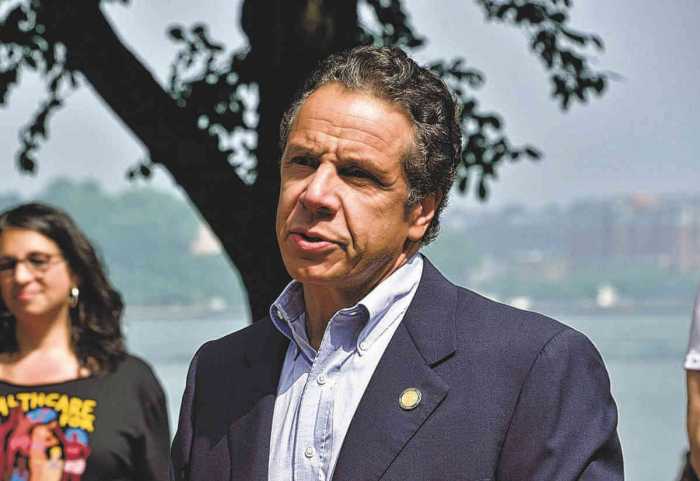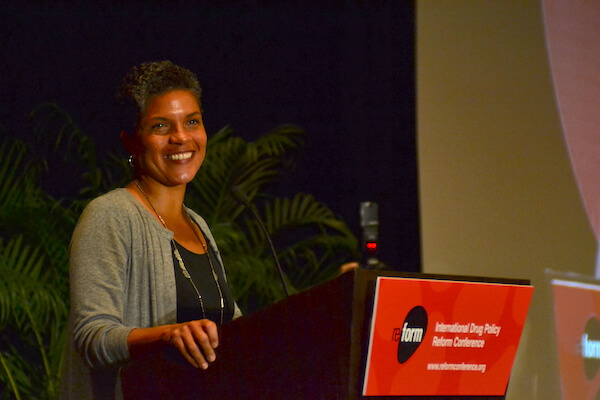Advocates for medical marijuana, aggravated by the narrowness of New York State’s path to date on the plan adopted into law last year, remain doggedly hopeful about the possibility of positive changes after the state health commissioner completes review of public comments.
The initial regulations posted in December were deeply disappointing. Although the law recognizes that, under limited circumstances, marijuana has medicinal purposes, the restrictions imposed treat it as an “illicit substance,” making New York’s program one of the most restrictive in the nation.
At a rally at Hostos Community College in the Bronx on February 3, Julie Netherland a leader in Compassionate Care New York, one of the many groups that lobbied for the law, said, “The first draft of regulation offered a narrow interpretation of the statute instead of a more expansive one.”
Among the major problems is that health insurance won’t pay for these medicines, and although the state fixes the price after consulting with the businesses that will grow and sell it, there are no provisions for a sliding scale to help moderate and low-income patients.
Those at the Hostos rally expressed concern that the law would reproduce existing injustices endemic in New York’s posture toward drug laws. The proposed regulation, a number of speakers argued, would require many families to get their medication in the underground economy and face legal risks.
The law gives the health commissioner, Dr. Howard A. Zucker, discretion to make modifications in rolling out the program, but Governor Andrew Cuomo rejected a legislative proposal to have a board of doctors establish flexible governance. The legislation authorized dispensing for illnesses including cancer, epilepsy, and HIV, and required the health commissioner to consider adding five more, including Alzheimer’s, muscular dystrophy, and post-traumatic stress disorder. These illnesses were not added in the draft regulations released in December.
Speaking at Hostos, Manhattan City Councilmember Mark Levine said he supports taxing and regulating marijuana so its sale is legal, but focused his remarks on the limited number of ailments cited in the law. He struggles with migraine headaches, another illness that many patients treat with marijuana but is not specifically allowed by New York’s new law — though the health commissioner could use discretion to add it to the program.
Right now, however, Zucker is proposing the most restrictive interpretation of the law. Patients must provide a doctor’s certification to apply to the state health department for a license to purchase medical marijuana. The $50 application fee can be waived for low-income patients. Doctors cannot prescribe it unless they have received special training, an unusual restriction not seen in other programs around the country.
Only five producers will be authorized to grow marijuana in greenhouses that must be secured to prevent theft or diversion of the crop. It must be laboratory tested at the expense of the registered producer and sold in dispensaries controlled by the producer. Before the medicine is produced, the producers must reach an agreement with the health department on price. An excise tax is imposed on the sale of these medicines. Only 20 dispensaries are permitted statewide and no delivery services are permitted, so many patients will be forced to travel long distances.
The marijuana may not be smoked even though that is the cheapest and fastest way to feel marijuana’s effect. Netherland said the health commissioner is not prohibited from authorizing the sale of whole plants, the most economical way to make marijuana available. The regulations follow Cuomo’s direction and restrict the medicine to oils and extracts.
The governor’s team in Albany now has staff with experience in the drug reform movement, including Tracie M. Gardner, an assistant health secretary, so there is hope that the final regulations will be responsive to the public comments made.
“I don’t think it’s designed to fail and DOH will be able to remedy problems in the final regulations,” said Netherland, but the groups at Hostos warned in a handout that the present regulations have “so many restrictions it becomes unworkable, like New Jersey’s” program — widely seen as a failure among drug reform advocates.


































